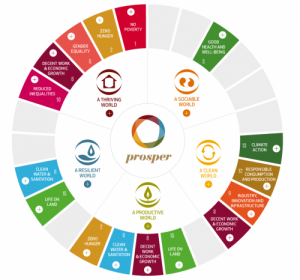Sustainability cannot be achieved in isolation. From Porter & Kramer’s Creating Shared Value concept to UN Sustainable Development Goals 2030, we’re seeing a huge push for businesses to lead the change. Arguably, businesses can also drive change a lot quicker than government, NGOs, or individual consumers. In the case of brands, Freya Williams showcased nine corporate green giants that were profiting from sustainability. These companies include Chipotle, Tesla, Nike,Unilever,IKEA, and General Electric (Willams, 2015).
In the same year, the UN Millennium Development Goals expired and have been taken over by the 17 Sustainable Development Goals for 2030. Unlike previous goals, there’s more of an emphasis for businesses to take part of the development process. These are the benefits for businesses if SDG are achieved by 2030 (Mitchell 2015).
- Easier to run a successful business from strengthened, more educated workforces
- SDGs will challenge businesses to innovate and grow new markets
- SDG makes a better business case for CSR and sustainability
- Better micro and macro structures
Perhaps a bit under the radar, SAB Miller a USD $22Billion company (SABMiller, 2014) is actively leveraging these new sustainable development goals for over 200 brands under their portfolio (Swaithes, 2015). Brands that you may associate with more include: Miller Lite, Milwaukee’s Best, Pilsner Urquell and Tyskie. SABMiller’s interpretation of the goals include creating a thriving, sociable, clean, productive and resilient world.
A brand that is already doing really well is the Eagle Lager. This beer is brewed out of Uganda, using locally produced crops and conventional lager. By replacing expensive imported materials with locally sourced crops, the business model improves livelihoods (Levitt, 2016) of the 20,0000 farmers (Sustainable Brands 2015). For a place like Uganda, a place This is another example of Porter & Kramer’s shared value creation at work. The operations are improving the local business environment by employing farmers. Productivity is increased in the supply chain by replacing raw material inputs. Today, the Eagle Lager accounts for over 50% revenue for Nile Breweries, a SABMiller subsidiary.
With 22.3 Billion dollars in FY 2014, that would tuck SABMiller in the 3rd place of William’s green giant list. Although in 2015, there are only three brands that SABMiller highlighted success, I’m curious to see how SABMiller will be able to deliver their goal of building sustainable development messages into three brands in each market they operate in. Keeping in mind that SABMiller was acquired in October 2016 by ABInBev (think Budweiser, Corona, Keiths, ShockTop), I wonder if leveraging SDG as a strategy will diffuse across the entire business.
Sources:
Levitt, T. (2016). Eagle lager: the Ugandan beer that aims to help local farmers and communities. The Guardian. Retrieved on Jan.18, 2017 from https://www.theguardian.com/sustainable-business/2016/may/27/eagle-lager-ugandan-beer-local-farmers-communities-sabmiller
Mitchell, M. (2015). How Brands Can Leverage the Sustainable Development Goals. Sustainable Brands. Retrieved on Jan.18, 2017 from http://www.sustainablebrands.com/news_and_views/stakeholder_trends_insights/melody_mitchell/how_brands_can_leverage_sustainable_devel
Nurin, T. (2016). It’s Final: AB InBev Closes on Deal to Buy SABMiller. Forbes. Retrieved Jan.18, 2016 from http://www.forbes.com/sites/taranurin/2016/10/10/its-final-ab-inbev-closes-on-deal-to-buy-sabmiller/#4d60af9737d6
SABMiller (2014). Annual Report. Retrieved on Jan.18, 2017 from http://www.portalchemy.com/ReportTool100.asp
Swaithes, A. (2015). Leveraging the New UN Sustainable Development Goals: Expectations and Engagement Strategies for Brands. Sustainable Brands. Retrieved on Jan.18, 2017 from http://www.sustainablebrands.com/digital_learning/slideshow/organizational_change/leveraging_new_un_sustainable_development_goals_exp
Williams, F. (2015). 9 Green Giants: billion-Dollar Businesses that are Sustainable. Fortune. Retrieved on Jan.18, 2017 from http://fortune.com/2015/08/27/green-giants-freya-williams/

